外研版八年级英语下册Module 8 Time off 复习课课件(共59张PPT;无音频)
文档属性
| 名称 | 外研版八年级英语下册Module 8 Time off 复习课课件(共59张PPT;无音频) | 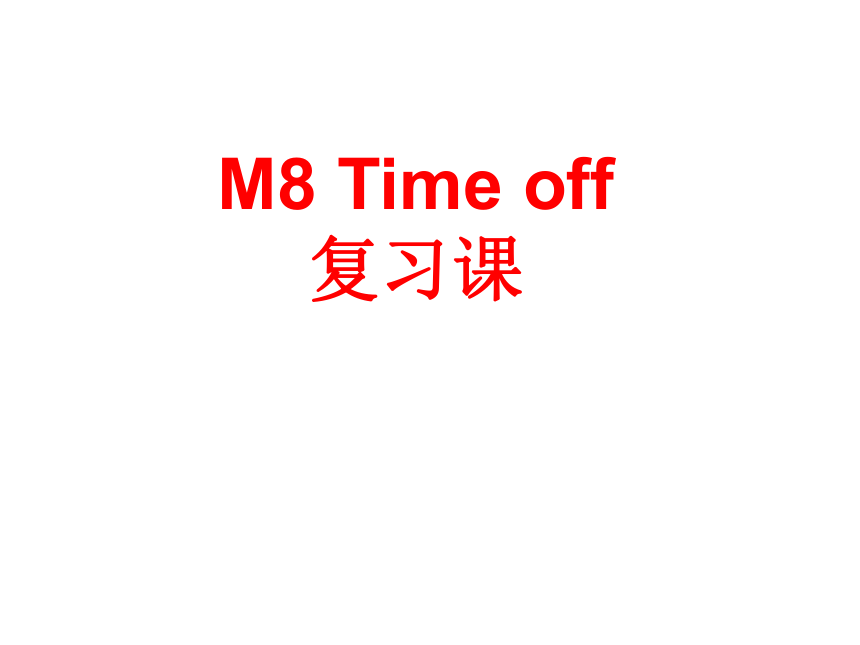 | |
| 格式 | zip | ||
| 文件大小 | 221.8KB | ||
| 资源类型 | 教案 | ||
| 版本资源 | 外研版 | ||
| 科目 | 英语 | ||
| 更新时间 | 2020-04-28 08:50:00 | ||
图片预览

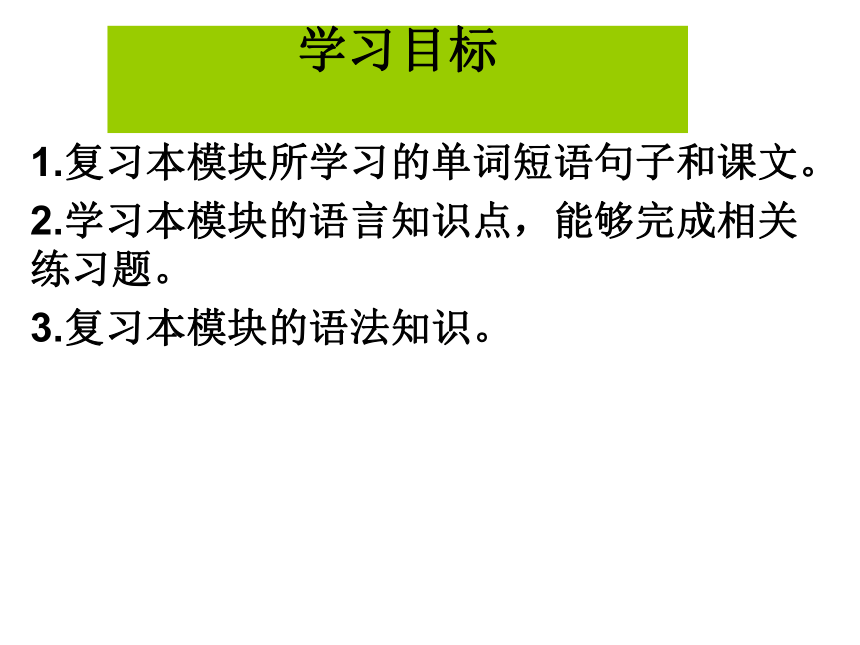
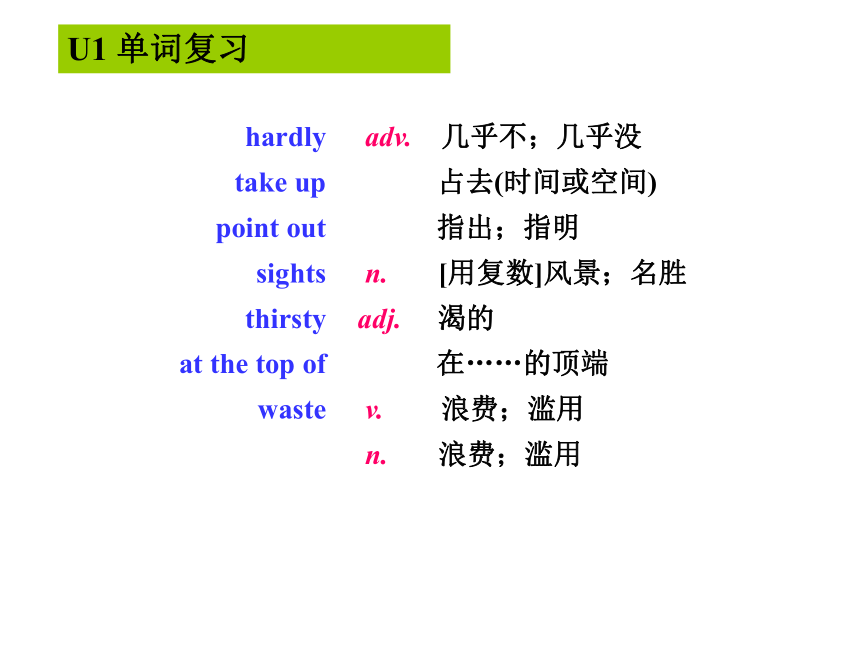
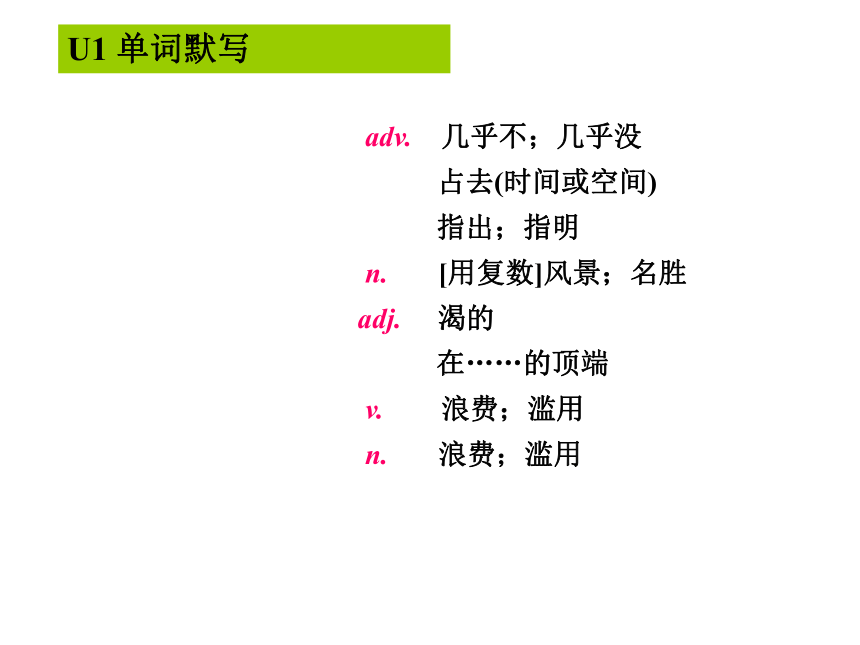
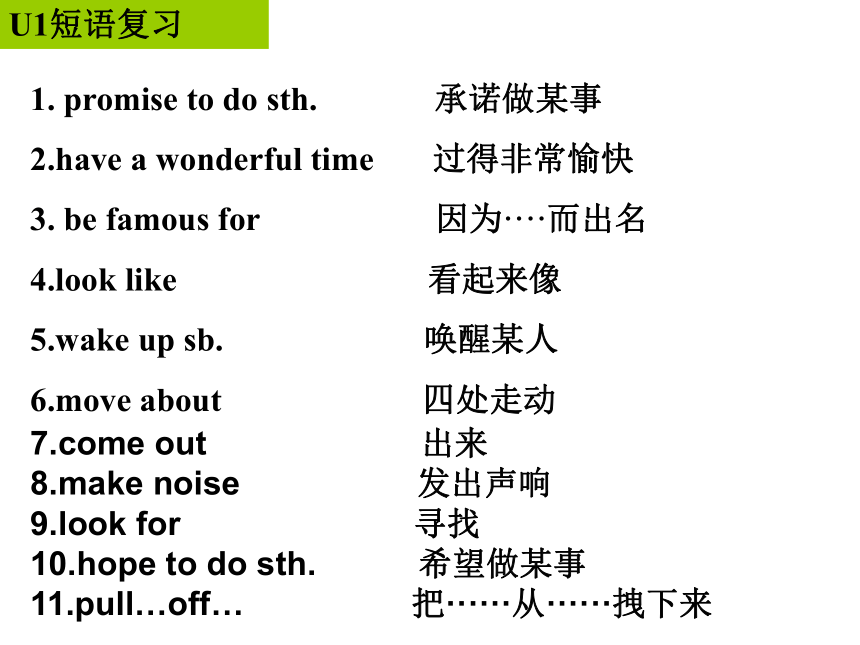
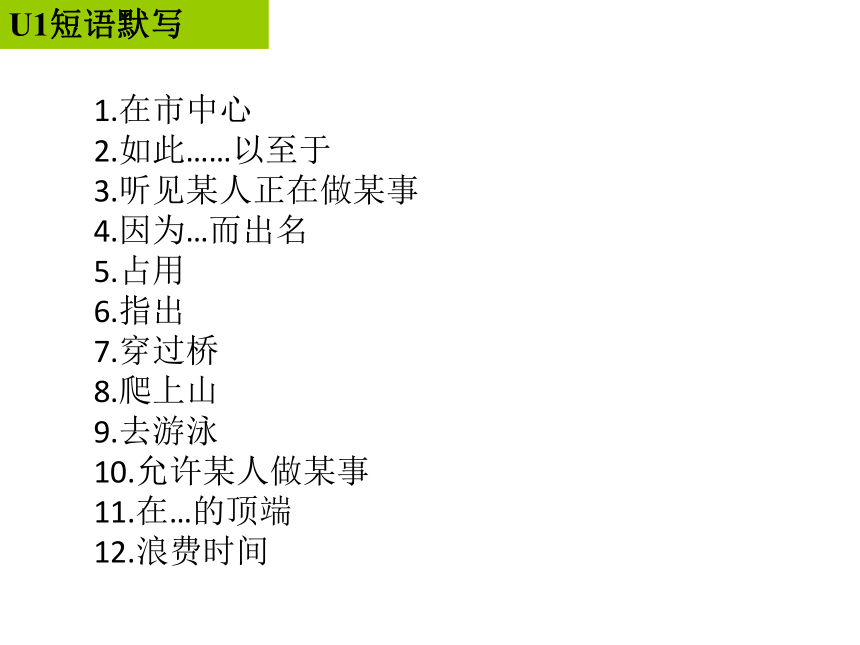
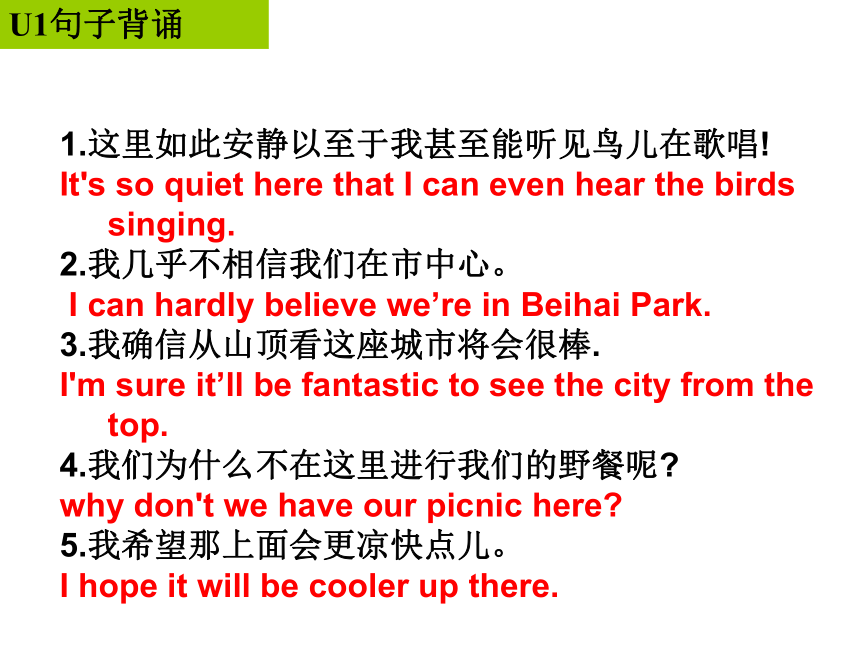
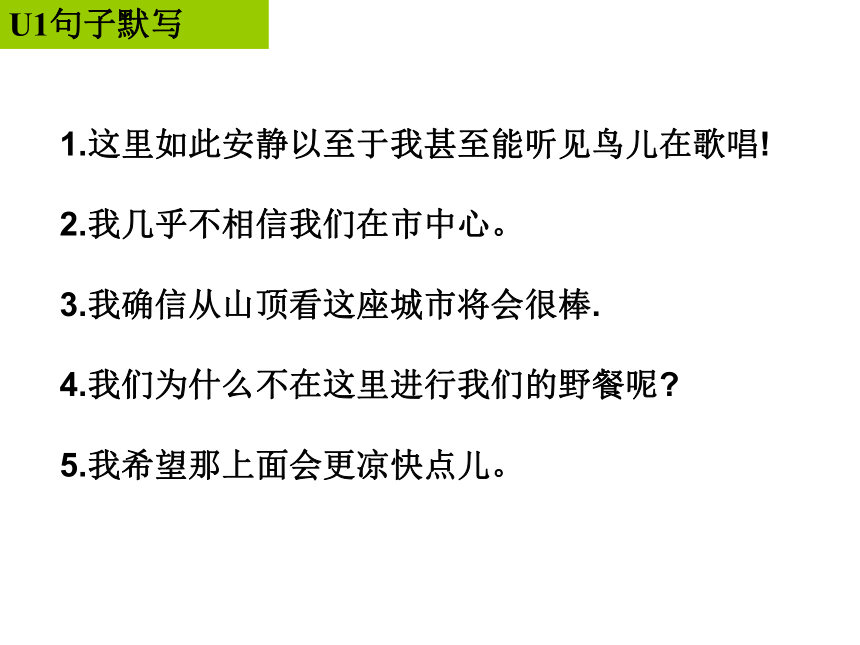
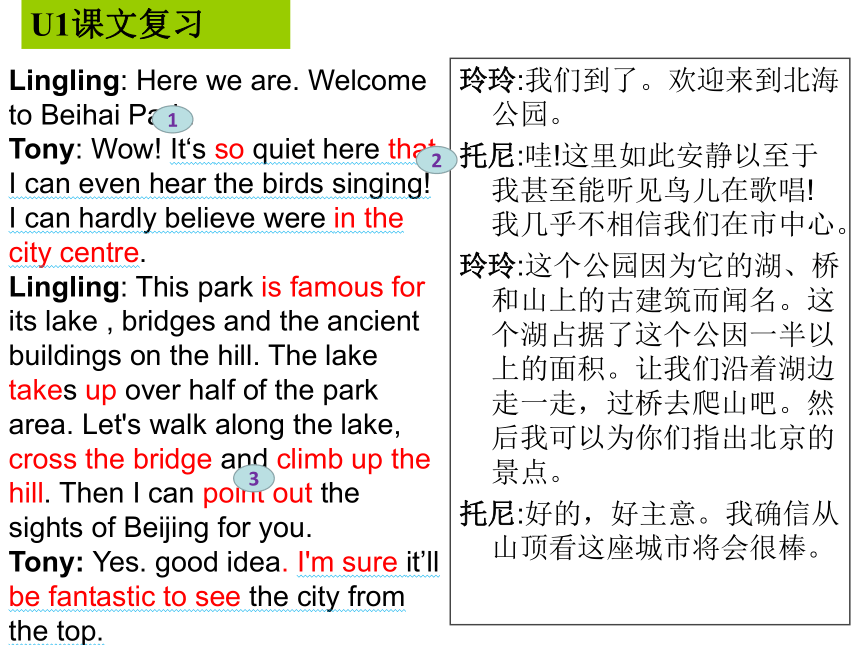
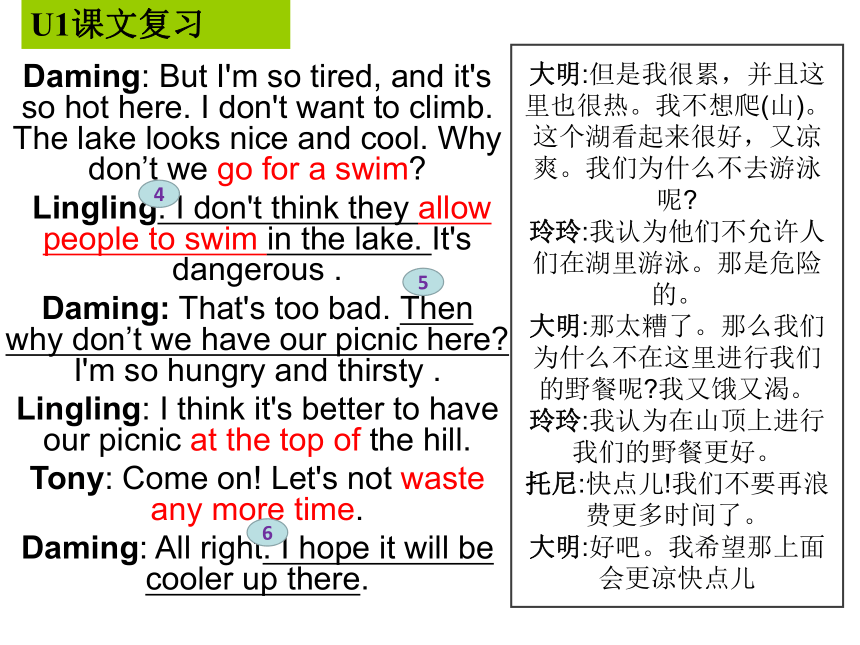
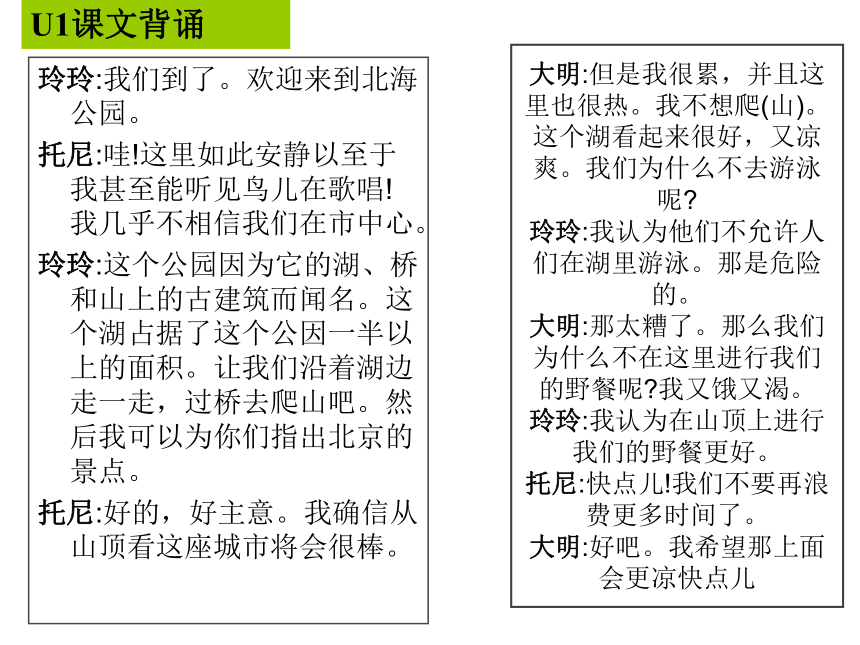
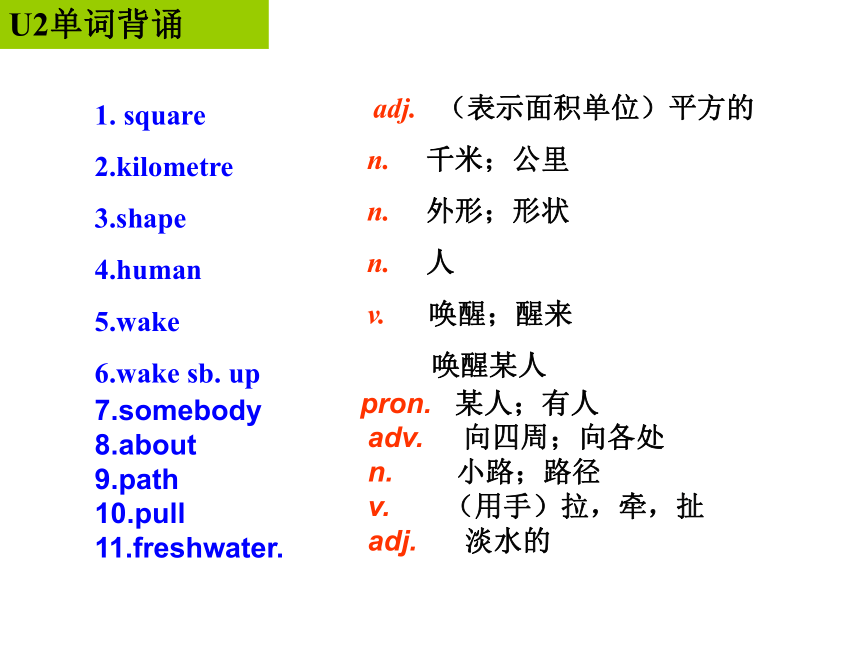
文档简介
课件59张PPT。M8 Time off
复习课学习目标
1.复习本模块所学习的单词短语句子和课文。
2.学习本模块的语言知识点,能够完成相关练习题。
3.复习本模块的语法知识。 hardly
take up
point out
sights
thirsty
at the top of
waste adv. 几乎不;几乎没
占去(时间或空间)
指出;指明
n. [用复数]风景;名胜
adj. 渴的
在……的顶端
v. 浪费;滥用
n. 浪费;滥用U1 单词复习 adv. 几乎不;几乎没
占去(时间或空间)
指出;指明
n. [用复数]风景;名胜
adj. 渴的
在……的顶端
v. 浪费;滥用
n. 浪费;滥用U1 单词默写1. promise to do sth. 承诺做某事
2.have a wonderful time 过得非常愉快
3. be famous for 因为····而出名
4.look like 看起来像
5.wake up sb. 唤醒某人
6.move about 四处走动
7.come out 出来
8.make noise 发出声响
9.look for 寻找
10.hope to do sth. 希望做某事
11.pull…off… 把······从······拽下来U1短语复习1.在市中心
2.如此……以至于
3.听见某人正在做某事
4.因为…而出名
5.占用
6.指出
7.穿过桥
8.爬上山
9.去游泳
10.允许某人做某事
11.在…的顶端
12.浪费时间U1短语默写1.这里如此安静以至于我甚至能听见鸟儿在歌唱!
It's so quiet here that I can even hear the birds singing.
2.我几乎不相信我们在市中心。
I can hardly believe we’re in Beihai Park.
3.我确信从山顶看这座城市将会很棒.
I'm sure it’ll be fantastic to see the city from the top.
4.我们为什么不在这里进行我们的野餐呢?
why don't we have our picnic here?
5.我希望那上面会更凉快点儿。
I hope it will be cooler up there.U1句子背诵1.这里如此安静以至于我甚至能听见鸟儿在歌唱!
2.我几乎不相信我们在市中心。
3.我确信从山顶看这座城市将会很棒.
4.我们为什么不在这里进行我们的野餐呢?
5.我希望那上面会更凉快点儿。U1句子默写Lingling: Here we are. Welcome to Beihai Park.
Tony: Wow! It‘s so quiet here that I can even hear the birds singing! I can hardly believe were in the city centre.
Lingling: This park is famous for its lake , bridges and the ancient buildings on the hill. The lake takes up over half of the park area. Let's walk along the lake, cross the bridge and climb up the hill. Then I can point out the sights of Beijing for you.
Tony: Yes. good idea. I'm sure it’ll be fantastic to see the city from the top.玲玲:我们到了。欢迎来到北海公园。
托尼:哇!这里如此安静以至于我甚至能听见鸟儿在歌唱!我几乎不相信我们在市中心。
玲玲:这个公园因为它的湖、桥和山上的古建筑而闻名。这个湖占据了这个公因一半以上的面积。让我们沿着湖边走一走,过桥去爬山吧。然后我可以为你们指出北京的景点。
托尼:好的,好主意。我确信从山顶看这座城市将会很棒。123U1课文复习大明:但是我很累,并且这里也很热。我不想爬(山)。这个湖看起来很好,又凉爽。我们为什么不去游泳呢? 玲玲:我认为他们不允许人们在湖里游泳。那是危险的。 大明:那太糟了。那么我们为什么不在这里进行我们的野餐呢?我又饿又渴。 玲玲:我认为在山顶上进行我们的野餐更好。 托尼:快点儿!我们不要再浪费更多时间了。 大明:好吧。我希望那上面会更凉快点儿Daming: But I'm so tired, and it's so hot here. I don't want to climb. The lake looks nice and cool. Why don’t we go for a swim?
Lingling: I don't think they allow people to swim in the lake. It's dangerous .
Daming: That's too bad. Then why don’t we have our picnic here? I'm so hungry and thirsty .
Lingling: I think it's better to have our picnic at the top of the hill.
Tony: Come on! Let's not waste any more time.
Daming: All right. I hope it will be cooler up there.
456U1课文复习大明:但是我很累,并且这里也很热。我不想爬(山)。这个湖看起来很好,又凉爽。我们为什么不去游泳呢? 玲玲:我认为他们不允许人们在湖里游泳。那是危险的。 大明:那太糟了。那么我们为什么不在这里进行我们的野餐呢?我又饿又渴。 玲玲:我认为在山顶上进行我们的野餐更好。 托尼:快点儿!我们不要再浪费更多时间了。 大明:好吧。我希望那上面会更凉快点儿U1课文背诵玲玲:我们到了。欢迎来到北海公园。
托尼:哇!这里如此安静以至于我甚至能听见鸟儿在歌唱!我几乎不相信我们在市中心。
玲玲:这个公园因为它的湖、桥和山上的古建筑而闻名。这个湖占据了这个公因一半以上的面积。让我们沿着湖边走一走,过桥去爬山吧。然后我可以为你们指出北京的景点。
托尼:好的,好主意。我确信从山顶看这座城市将会很棒。1. square
2.kilometre
3.shape
4.human
5.wake
6.wake sb. up
7.somebody
8.about
9.path
10.pull
11.freshwater. adj. (表示面积单位)平方的
n. 千米;公里
n. 外形;形状
n. 人
v. 唤醒;醒来
唤醒某人
pron. 某人;有人
adv. 向四周;向各处
n. 小路;路径
v. (用手)拉,牵,扯
adj. 淡水的U2单词背诵 1.adj. (表示面积单位)平方的
2.n. 千米;公里
3. n. 外形;形状
4. n. 人
5. v. 唤醒;醒来
6. 唤醒某人
7.pron. 某人;有人
8. adv. 向四周;向各处
9. n. 小路;路径
10.v. (用手)拉,牵,扯
11.adj. 淡水的U2单词默写1. promise to do sth. 承诺做某事
2.have a wonderful time 过得非常愉快
3. be famous for 因为····而出名
4.look like 看起来像
5.wake up sb. 唤醒某人
6.move about 四处走动
7.come out 出来
8.make noise 发出声响
9.look for 寻找
10.hope to do sth. 希望做某事
11.pull…off… 把······从······拽下来U2短语背诵1.承诺做某事
2.过得非常愉快
3.因为····而出名
4.看起来像
5.唤醒某人
6.四处走动
7.出来
8.发出声响
9.寻找
10.希望做某事
11.把······从······拽下来U2短语默写有的石头看起来像人,有的看起来像野兽。
Some of them look like humans while others look like wild animals.
2.我们原以为有人在四处走动。
We thought somebody was moving about.
3.我们悄悄地走出宿营地,发现只是一只饥饿的猴子在找东西吃。
We came out without making any noise ,and found it was just a hungry monkey looking for food.
4.但是很遗憾,今天多云。
But it was a pity that it was cloudy.
5.我从一株植物上扯下了一片叶子。
I pulled a leaf off a plant.U2句子背诵有的石头看起来像人,有的看起来像野兽。
2.我们原以为有人在四处走动。
3.我们悄悄地走出宿营地,发现只是一只饥饿的猴子在找东西吃。
4.但是很遗憾,今天多云。
5.我从一株植物上扯下了一片叶子。U2句子默写我答应会写信的,所以,
我 们现在湖南省的叔叔这儿。我在张家界国家森林公园玩得非常开心。这是一片有山、有河、有森林的神奇的地方。这个公园很大,面积约有480平方千米。它以奇形怪状的巨石而闻名有的石头看起来像人,有的看起来像野兽。
昨晚我们在二个小测边宿营,夜间我们听到一些响动,每个人都被吵醒了。我们原以为有人在四处走动。玲玲的叔叔说那是动物发出的声音.我们悄悄地走出宿营地,发现只是一只饥饿的猴子在找东西吃。
今天上午我们爬上了天子山。我们本希望能在山顶看到下面的湖泊和森林。但是很遗憾,今天多云,我们只能看到云雾缭绕的山顶。后来我们顺着山路下行,沿途经过小河、片片树林和其他植被,回到了露营地。我从一株植物上扯下了一片叶子,但是玲玲的叔叔说摘叶子是不对的,我们应该保护这里的一切。我感觉很惭愧。
明天我们要去游览中国第二大淡水湖一一洞庭湖。我们下周就回家。真希望你们也在这里啊!U2课文背诵U1知识点讲解1.It’s so quiet here that I can even hear the birds singing!
这里如此安静,以至于我甚至能听见鸟儿在唱歌!
so…that… 意为 “如此……以致……”,引导结果状语从句。辨析: so…that…与 so that(1)今天早上我起床很早,以便能赶上早班公共汽车。
I got up early I could catch the early bus this morning.?
(2)他很生气,以至于说不出一句话。
He was he couldn’t say a word.?1.It’s so quiet here that I can even hear the birds singing!
这里如此安静,以至于我甚至能听见鸟儿在唱歌!
so…that… 意为 “如此……以致……”,引导结果状语从句。辨析: so…that…与 so that(1)今天早上我起床很早,以便能赶上早班公共汽车。
I got up early I could catch the early bus this morning.?
(2)他很生气,以至于说不出一句话。
He was he couldn’t say a word.?so thatso angry that2.It’s so quiet here that I can even hear the birds singing!
这里如此安静,以至于我甚至能听见鸟儿在唱歌!【学以致用】
1.I often hear him _____ (sing)in the room .Listen ,I can hear him _____ (sing ).
2. It’s so noisy that I can’t hear the teacher _________(teach).(2) hear sb. doing sth.意为“听见某人正在做某事”,动词ing形式作宾语补足语,强调听到动作正在进行
Eg:We heard someone playing the piano in the room.
我们听到有人正在房间里弹铜琴
hear sb. do sth.意为“听见某人做某事”,省略to的动词不定式作宾语补足语,强调听到动作的全过程或听到动作经常发生。
Eg:I heard my father go out..我听见我父亲出去了。
I often hear Jimmy sing in English.
我经常听到吉米用英语唱歌 。2.It’s so quiet here that I can even hear the birds singing!
这里如此安静,以至于我甚至能听见鸟儿在唱歌!【学以致用】
1.I often hear him _____ (sing)in the room .Listen ,I can hear him _____ (sing ).
2. It’s so noisy that I can’t hear the teacher _________(teach).singsingingteaching(2) hear sb. doing sth.意为“听见某人正在做某事”,动词ing形式作宾语补足语,强调听到动作正在进行
Eg:We heard someone playing the piano in the room.
我们听到有人正在房间里弹铜琴
hear sb. do sth.意为“听见某人做某事”,省略to的动词不定式作宾语补足语,强调听到动作的全过程或听到动作经常发生。
Eg:I heard my father go out..我听见我父亲出去了。
I often hear Jimmy sing in English.
我经常听到吉米用英语唱歌 。3. I can hardly believe we’re in the city centre.
我几乎不敢相信我们是在市中心。 e.g. I hardly know you.
我不太认识你。
She can hardly see the words on the blackboard.
她几乎看不见黑板上的字。
I haven’t seen her for years but she has hardly
changed at all.
我很多年没见她了,但她几乎没变。hardly用作副词,意为“几乎不”,本身有否定含意。放于be 动词或助动词之后、行为动词之前。e.g. He?works?hard.? 他努力工作。
He?hardly?works.? 他几乎不工作。hard和hardly用作副词时,词义差别很大。hard 用作副词时,意为“努力地,猛烈地,剧烈地”。hardly作副词,意为“几乎不”,多和can连用,接近almost not,也可表示“几乎没有”的意思。Helen?was?so?excited?at?the?news?that she?could? say?a?
word.????????????
A.?ever?????? B.?almost????????????C.?hardly???????????D.?alwaysPracticee.g. He?works?hard.? 他努力工作。
He?hardly?works.? 他几乎不工作。hard和hardly用作副词时,词义差别很大。hard 用作副词时,意为“努力地,猛烈地,剧烈地”。hardly作副词,意为“几乎不”,多和can连用,接近almost not,也可表示“几乎没有”的意思。Helen?was?so?excited?at?the?news?that she?could? say?a?
word.????????????
A.?ever?????? B.?almost????????????C.?hardly???????????D.?alwaysPractice4.This park is famous for its lake, bridges and the ancient buildings on the hill.这个公园因为它的湖、桥和山上的古建筑而闻名。
be famous for…意为 “因……而闻名/著名”,相当于 be known for, for后接名词或代词,表示著名的原因。如:
他因其作品而闻名。He is famous for his works.拓展:be famous as…作为……而闻名/著名,如:
莫言作为一个伟大的作家而闻名。
Mo Yan is famous as a great writer.【学以致用】
吴京因在电影《战狼2》中作为一名出色的演员而闻名。
Wu Jing is famous his film Wolf Warrior II
a great actor.?foras e.g. This books take up too much room.
这些书太占地方。
I don’t want to take up too much of your time.
我不想占用你太多的时间。这里的take up表示“占用,花费(时间、空间或精力等)”。学以致用:
1. The box ____ too much room, please take it out of the room.
A. takes up B. take up C. takes off D. take off2. 这张桌子太占地方。5. The lake takes up over half of the park area.
湖占据了这个公园一半多的面积。 e.g. This books take up too much room.
这些书太占地方。
I don’t want to take up too much of your time.
我不想占用你太多的时间。这里的take up表示“占用,花费(时间、空间或精力等)”。学以致用:
1. The box ____ too much room, please take it out of the room.
A. takes up B. take up C. takes off D. take off2. 这张桌子太占地方。5. The lake takes up over half of the park area.
湖占据了这个公园一半多的面积。This table takes up too much room.6. Then I can point out the sights of Beijing for you.
然后我可以为你们指指北京的景点。point out 表示“指出,指明”。e.g. Mr Li points out our shortcomings. We will correct them.
李先生指出了我们的缺点。我们要改正。
Please point out the mistakes.
请指出错误。学以致用:
If there are mistakes, please ____ for me.
A. point it out B. point them out
C. point out it D. point out them6. Then I can point out the sights of Beijing for you.
然后我可以为你们指指北京的景点。point out 表示“指出,指明”。e.g. Mr Li points out our shortcomings. We will correct them.
李先生指出了我们的缺点。我们要改正。
Please point out the mistakes.
请指出错误。学以致用:
If there are mistakes, please ____ for me.
A. point it out B. point them out
C. point out it D. point out themallow sb. to do sth. 表示“允许某人去做某事”。 ( sb. 不可以省略)
e.g. My parents won’t allow me to come
back late.
我父母不允许我晚回来。
allow doing sth. 允许做某事
They allowed smoking in this room only.
他们只允许在这间屋子里抽烟。 学以致用:
1.My parents don’t allow me (go)out at night.2. 老板不许我使用电话。7. I don’t think they allow people to swim in the lake.
我想这里禁止游泳。allow sb. to do sth. 表示“允许某人去做某事”。 ( sb. 不可以省略)
e.g. My parents won’t allow me to come
back late.
我父母不允许我晚回来。
allow doing sth. 允许做某事
They allowed smoking in this room only.
他们只允许在这间屋子里抽烟。 学以致用:
1.My parents don’t allow me (go) out at night.2. 老板不许我使用电话。7. I don’t think they allow people to swim in the lake.
我想这里禁止游泳。to goMy boss doesn’t allow me to use the phone.8.Let's not waste any more time我们不要再浪费更多时间了A.waste此处用作动词,意为“浪费;濫用”。其常见用法如下(1)waste money/time (in) doing sth. 浪费金钱/时间做某事Don't waste your time (in) playing computer games.
不要把时间浪费在玩电脑游戏上
2)waste money/time on sth. 浪费金钱/时间在某物上
Why do you waste so much money on clothes?
你为么浪费这么多钱买衣服呢?
B. waste 还可用作名词, 意为“浪费滋用”
Eg: It's a waste of time to speak to her9. I hope it will be cooler up there.
但愿上面能凉快点儿。e.g. I can hardly believe we’re in the city centre.
I’m sure it’ll be fantastic to see the city from the top.
I don’t think they allow people to swim in the lake.
I think it’s better to have our picnic at the top of the hill.hope意为“希望”,表示实现的可能性很大,可用作hope?to?do?sth.或hope +?that从句。后者that从句在句中起宾语作用,这样的从句叫宾语从句。本课中还有:U2知识点讲解1. I promised to write, so…
promise to do sth. 答应做某事; 承诺做某事
e.g.: My father promised me a computer.
= My father promised a computer to me.
promise sb. sth. = promise sth. to sb.
答应给某人某物; 许诺某人某物U2Language points2. I'm having a wonderful time here in Zhangjiajie.
have a wonderful / great / good time
= enjoy oneself = have fun
e.g.: 明天我们要玩个痛快.
We'll have a wonderful time tomorrow. U2Language points3. It’s famous for the strange shape of its tall rocks.
它以奇形怪状的巨石而著名。e.g. China is famous for the Great Wall.
中国以长城而闻名。
Beijing is famous for its history.
北京以它的历史而闻名。be famous for意为“因……而著名”。Language points4. Some of them look like humans while others look like wild animals.
有的石头看起来像人,有的看起来像兽。e.g. The?ceiling?is?white, while the walls are green.
天花板是白色的,而墙是绿色的。
He is a worker while I’m a doctor.
他是工人,而我是医生。while用作并列连词,用于两个分句的对比,意为“然而,可是”。Language points5.other, the other, another 别的, 其他的
(1) John did better than all the other students in the sport.
(2) I have two dress. One is red; the other (dress) is black.
(3) I want to drink another one.
other: 别的, 另外的. 只能与复数名词连用
the other: 两个中的另一个. 表示特指, 总数为两个.
常用结构: one…the other…
another: 三个或三个以上中任意的另一个, 再一个. 表示泛指Language points6. It woke everybody up.
每个人都被吵醒了。在这里wake up为及物动词短语,表示“唤醒,弄醒”。它还可以作不及物动词,表示“醒来”。e.g. Wake up the children and dress them. 叫醒孩子,给他们穿上衣服。
I woke up at six o’clock this morning. 今天早上我六点就醒来了。Language points7. We thought somebody was moving about.
我们原以为有人在四处走动。e.g. Somebody wants to see you, Mary.
玛丽,有人想见你。
I can hear somebody moving about upstairs.
我听见楼上有人来回走动。somebody为不定代词,意为“某人,人人”,用作单数,等同于someone。
move about的意思是“走来走去”。Language points8. We came out without making any noise, and found it was just a hungry monkey looking for food.
make(a) noise 发出声响;制造噪音
without (doing) sth 没有做某事
e.g.: He walked past me without making any noise.
现在分词短语"looking for food"作"a hungry monkey"的后置定语, 表示所修饰的名词正在进行的动作, 两者是逻辑上的主谓关系.
e.g.: 湖边有一位年轻人在钓鱼.
There is a young man fishing by the lake. Language points9. From the top we hoped to see… 在山顶我们希望看到…… hope to do sth.意为“希望做某事”。 【拓展】hope的其他常见用法: hope for + n. hope + that clausee.g. I hope to have a nice house. 我渴望拥有一套漂亮的房子。 We hope for an early reply. 我们希望早日得到答复。
Our teacher hopes (that) we should study hard for the
bright future.
老师希望我们为了美好的明天努力学习。Language points10. But it was a pity that it was cloudy.
Review: It's a pity + that 从句 很遗憾…
e.g.: 很遗憾他不能来.
It's a pity that he can't come.Language points Tomorrow we're going to Dongting Lake, the second-largest freshwater lake in China. We’ll be back home next week! Wish you were here!
明天我们要去游览中国第二大淡水湖一一洞庭湖。我们下周就回家。真希望你们也在这里啊!课文翻译11. Tomorrow we’re going to Dongting Lake, the second largest freshwater lake in China. 明天我们打算去洞庭湖 —— 中国第二大淡水湖。 the second largest 意为“第二大……”。
“the + 序数词 + 形容词最高级” 表示“第几最……的”。 e.g. Yellow River is the second largest river in China.
黄河是中国第二长的河流。
She is the second tallest student in our class.
她是我们班第二高的学生。Language points12. Wish you were here! 真希望你们也在这里啊! wish在此作动词,意为“希望、视愿”,后接that引导的宾语从句(that省略),表示与现在的事实相反或不可能实现的思望时,从句用虚拟语气,从句中谓语动词用过去式,be动词一律用were。
Eg;I wish I could fly like a bird.我希望自己能像乌一样飞期。, Wish I were with you.真希望(现在)我和你们在一起。
拓展:①wish作动词时还有以下搭配:
wish to do sth.“希望做某事wish sb. to do sth.“希望某人做某事wish sb. sth.“祝福某人……”
Bill wishes to go shopping this afternoon.比尔希望今天下午去购物。
My mother wishes me to learn English well.我妈妈布望我学好英语。Wish you success祝你成功。
②wish作名词,意为“愿望;希望”。
What is his wish他的题望是什么Language points一、宾语从句的定义
放在动词后面作宾语的句子,我们称为“宾语从句”。
二、宾语从句的分类
(1) that引导的宾语从句
(2) whether / if引导的宾语从句
(3) 疑问词引导的宾语从句
本模块主要学习that引导的宾语从句。宾语从句that 引导的宾语从句 并非所有的动词后面都可以接that引导的宾语从句,只有当谓语动词表示肯定概念时,如 believe,expect,explain,feel,hear,hope,imagine,prefer,promise,report,say,see,tell,think,understand,warn,wish等,其后面的句子一般由that引导。此时,that没有任何实际意义,目的是使读者清楚后面的句子是作前面动词的宾语,多数情况下可以省略。e.g. I hope (that) it will snow this winter.
I believe (that) we shall become good friends.
Betty thinks (that) trees can improve the air.有些宾语从句不能省略that。
如果谓语动词后跟有两个或更多个并列的宾语从句,第二个及以后的that都不可以省略。
e.g. He said (that) the book was very interesting and that(不省
略) all the children like to read it.
2) 主语中有it作形式宾语,that不可省。
e.g. I think it necessary that (不省略) he should stay here.?
3) that引导的宾语从句作介词宾语时,that不能省略。
e.g. He hasn’t changed at all except that he’s no longer so talkative.1)如果主句是现在的某种时态(包括一般现在时、现在进行时、现在完成时),那么宾语从句的时态应根据实际情况而定。
e.g. She says (that) she has never been to Mount Ermei.
她说她从来没有去过峨嵋山。
2)如果主句是过去的某种时态,其宾语从句一般要用过去的某种时态。
e.g. He said (that) they were having a meeting at that time.
他说他们那时正在开会。
3)如果宾语从句表示客观事实、自然现象或真理,即使主句是过去的某种时态,从句也用一般现在时态。
e.g. He said that light travels much faster than sound.
他说光比声音传播得快。 宾语从句的时态问题 主句是 I / We think / suppose / guess / believe 等时,
从句中的否定习惯上要转移到主句中,这就是否定转移。
e.g. 我认为鸡不会游泳。
误:I think chickens can not swim.
正:I don’t think chickens can swim. 宾语从句的否定转移Grammar — that 引导的宾语从句一、宾语从句
当我们要用英语表达“我知道你昨天去看电影了”时,我们无法在know后用一个单词或一个短语表达出“你昨天去看电影了”这个意思。“你昨天去看电影了”这个结构中包含行为本身、行为的执行者和行为的承受者,是一个完整的句子。这种放在动词后面作宾语的句子,我们称为“宾语从句”。
二、宾语从句的分类
(1)that引导的宾语从句
(2)whether / if引导的宾语从句
(3)疑问词引导的宾语从句
本模块主要学习that引导的宾语从句。 并非所有的动词后面都可以接that引导的宾语从句,只有当谓语动词表示肯定概念时,如 believe,expect,explain,feel,hear,hope,imagine,prefer,promise,report,say,see,tell,think,understand,warn,wish等,其后面的句子一般由that引导。此时,that没有任何实际意义,目的是使读者清楚后面的句子是作前面动词的宾语,多数情况下可以省略。e.g. I hope (that) it will be sunny this afternoon.
I believe (that) you’re right.
Betty thinks (that) books can improve knowledge.Grammar — that 引导的宾语从句有些宾语从句不能省略that。
如果谓语动词后跟有两个或更多个并列的宾语从句,第二个及以后的that都不可以省略。
e.g. He said (that) the book was very interesting and that(不省
略) all the children like to read it.
2) 主语中有it作形式宾语,that不可省。
e.g. I think it necessary that (不省略) he should stay here.?
3) that引导的宾语从句作介词宾语时,that不能省略。
e.g. He hasn’t changed at all except that he’s no longer so talkative.Grammar — that 引导的宾语从句 think,believe,suppose,guess等动词作主句的谓语,且主句的主语是第一人称时,宾语从句的否定,习惯上要转移到主句中,即“否定转移”。?
e.g. I?don’t?believe?that?he?will?do?such?a?silly?thing.?
我相信他不会做如此愚蠢的事。
I don’t think chickens can swim.
我认为鸡不会游泳。
Grammar — that 引导的宾语从句1. She said, “My brother was here three days ago, but he is not here now.”
She said that her brother had been three days but
he was not there .
2. My sister said to me, “I’m leaving tomorrow.”
My sister told me that she was leaving .
3. The teacher said to the class, “Stop talking.”
The teacher told the class .
4. She said to her sister, “Don’t take off your coat.”
She her sister coat.
5. “I was born in 1996 in Wuhan,” said Mr Wang.
____________________________________________练习:将直接引语转换成间接引语。there beforethenthe next day to stop talking told not to take off her Mr Wang said that he was born in 1996 in Wuhan.
2.学习本模块的语言知识点,能够完成相关练习题。
3.复习本模块的语法知识。 hardly
take up
point out
sights
thirsty
at the top of
waste adv. 几乎不;几乎没
占去(时间或空间)
指出;指明
n. [用复数]风景;名胜
adj. 渴的
在……的顶端
v. 浪费;滥用
n. 浪费;滥用U1 单词复习 adv. 几乎不;几乎没
占去(时间或空间)
指出;指明
n. [用复数]风景;名胜
adj. 渴的
在……的顶端
v. 浪费;滥用
n. 浪费;滥用U1 单词默写1. promise to do sth. 承诺做某事
2.have a wonderful time 过得非常愉快
3. be famous for 因为····而出名
4.look like 看起来像
5.wake up sb. 唤醒某人
6.move about 四处走动
7.come out 出来
8.make noise 发出声响
9.look for 寻找
10.hope to do sth. 希望做某事
11.pull…off… 把······从······拽下来U1短语复习1.在市中心
2.如此……以至于
3.听见某人正在做某事
4.因为…而出名
5.占用
6.指出
7.穿过桥
8.爬上山
9.去游泳
10.允许某人做某事
11.在…的顶端
12.浪费时间U1短语默写1.这里如此安静以至于我甚至能听见鸟儿在歌唱!
It's so quiet here that I can even hear the birds singing.
2.我几乎不相信我们在市中心。
I can hardly believe we’re in Beihai Park.
3.我确信从山顶看这座城市将会很棒.
I'm sure it’ll be fantastic to see the city from the top.
4.我们为什么不在这里进行我们的野餐呢?
why don't we have our picnic here?
5.我希望那上面会更凉快点儿。
I hope it will be cooler up there.U1句子背诵1.这里如此安静以至于我甚至能听见鸟儿在歌唱!
2.我几乎不相信我们在市中心。
3.我确信从山顶看这座城市将会很棒.
4.我们为什么不在这里进行我们的野餐呢?
5.我希望那上面会更凉快点儿。U1句子默写Lingling: Here we are. Welcome to Beihai Park.
Tony: Wow! It‘s so quiet here that I can even hear the birds singing! I can hardly believe were in the city centre.
Lingling: This park is famous for its lake , bridges and the ancient buildings on the hill. The lake takes up over half of the park area. Let's walk along the lake, cross the bridge and climb up the hill. Then I can point out the sights of Beijing for you.
Tony: Yes. good idea. I'm sure it’ll be fantastic to see the city from the top.玲玲:我们到了。欢迎来到北海公园。
托尼:哇!这里如此安静以至于我甚至能听见鸟儿在歌唱!我几乎不相信我们在市中心。
玲玲:这个公园因为它的湖、桥和山上的古建筑而闻名。这个湖占据了这个公因一半以上的面积。让我们沿着湖边走一走,过桥去爬山吧。然后我可以为你们指出北京的景点。
托尼:好的,好主意。我确信从山顶看这座城市将会很棒。123U1课文复习大明:但是我很累,并且这里也很热。我不想爬(山)。这个湖看起来很好,又凉爽。我们为什么不去游泳呢? 玲玲:我认为他们不允许人们在湖里游泳。那是危险的。 大明:那太糟了。那么我们为什么不在这里进行我们的野餐呢?我又饿又渴。 玲玲:我认为在山顶上进行我们的野餐更好。 托尼:快点儿!我们不要再浪费更多时间了。 大明:好吧。我希望那上面会更凉快点儿Daming: But I'm so tired, and it's so hot here. I don't want to climb. The lake looks nice and cool. Why don’t we go for a swim?
Lingling: I don't think they allow people to swim in the lake. It's dangerous .
Daming: That's too bad. Then why don’t we have our picnic here? I'm so hungry and thirsty .
Lingling: I think it's better to have our picnic at the top of the hill.
Tony: Come on! Let's not waste any more time.
Daming: All right. I hope it will be cooler up there.
456U1课文复习大明:但是我很累,并且这里也很热。我不想爬(山)。这个湖看起来很好,又凉爽。我们为什么不去游泳呢? 玲玲:我认为他们不允许人们在湖里游泳。那是危险的。 大明:那太糟了。那么我们为什么不在这里进行我们的野餐呢?我又饿又渴。 玲玲:我认为在山顶上进行我们的野餐更好。 托尼:快点儿!我们不要再浪费更多时间了。 大明:好吧。我希望那上面会更凉快点儿U1课文背诵玲玲:我们到了。欢迎来到北海公园。
托尼:哇!这里如此安静以至于我甚至能听见鸟儿在歌唱!我几乎不相信我们在市中心。
玲玲:这个公园因为它的湖、桥和山上的古建筑而闻名。这个湖占据了这个公因一半以上的面积。让我们沿着湖边走一走,过桥去爬山吧。然后我可以为你们指出北京的景点。
托尼:好的,好主意。我确信从山顶看这座城市将会很棒。1. square
2.kilometre
3.shape
4.human
5.wake
6.wake sb. up
7.somebody
8.about
9.path
10.pull
11.freshwater. adj. (表示面积单位)平方的
n. 千米;公里
n. 外形;形状
n. 人
v. 唤醒;醒来
唤醒某人
pron. 某人;有人
adv. 向四周;向各处
n. 小路;路径
v. (用手)拉,牵,扯
adj. 淡水的U2单词背诵 1.adj. (表示面积单位)平方的
2.n. 千米;公里
3. n. 外形;形状
4. n. 人
5. v. 唤醒;醒来
6. 唤醒某人
7.pron. 某人;有人
8. adv. 向四周;向各处
9. n. 小路;路径
10.v. (用手)拉,牵,扯
11.adj. 淡水的U2单词默写1. promise to do sth. 承诺做某事
2.have a wonderful time 过得非常愉快
3. be famous for 因为····而出名
4.look like 看起来像
5.wake up sb. 唤醒某人
6.move about 四处走动
7.come out 出来
8.make noise 发出声响
9.look for 寻找
10.hope to do sth. 希望做某事
11.pull…off… 把······从······拽下来U2短语背诵1.承诺做某事
2.过得非常愉快
3.因为····而出名
4.看起来像
5.唤醒某人
6.四处走动
7.出来
8.发出声响
9.寻找
10.希望做某事
11.把······从······拽下来U2短语默写有的石头看起来像人,有的看起来像野兽。
Some of them look like humans while others look like wild animals.
2.我们原以为有人在四处走动。
We thought somebody was moving about.
3.我们悄悄地走出宿营地,发现只是一只饥饿的猴子在找东西吃。
We came out without making any noise ,and found it was just a hungry monkey looking for food.
4.但是很遗憾,今天多云。
But it was a pity that it was cloudy.
5.我从一株植物上扯下了一片叶子。
I pulled a leaf off a plant.U2句子背诵有的石头看起来像人,有的看起来像野兽。
2.我们原以为有人在四处走动。
3.我们悄悄地走出宿营地,发现只是一只饥饿的猴子在找东西吃。
4.但是很遗憾,今天多云。
5.我从一株植物上扯下了一片叶子。U2句子默写我答应会写信的,所以,
我 们现在湖南省的叔叔这儿。我在张家界国家森林公园玩得非常开心。这是一片有山、有河、有森林的神奇的地方。这个公园很大,面积约有480平方千米。它以奇形怪状的巨石而闻名有的石头看起来像人,有的看起来像野兽。
昨晚我们在二个小测边宿营,夜间我们听到一些响动,每个人都被吵醒了。我们原以为有人在四处走动。玲玲的叔叔说那是动物发出的声音.我们悄悄地走出宿营地,发现只是一只饥饿的猴子在找东西吃。
今天上午我们爬上了天子山。我们本希望能在山顶看到下面的湖泊和森林。但是很遗憾,今天多云,我们只能看到云雾缭绕的山顶。后来我们顺着山路下行,沿途经过小河、片片树林和其他植被,回到了露营地。我从一株植物上扯下了一片叶子,但是玲玲的叔叔说摘叶子是不对的,我们应该保护这里的一切。我感觉很惭愧。
明天我们要去游览中国第二大淡水湖一一洞庭湖。我们下周就回家。真希望你们也在这里啊!U2课文背诵U1知识点讲解1.It’s so quiet here that I can even hear the birds singing!
这里如此安静,以至于我甚至能听见鸟儿在唱歌!
so…that… 意为 “如此……以致……”,引导结果状语从句。辨析: so…that…与 so that(1)今天早上我起床很早,以便能赶上早班公共汽车。
I got up early I could catch the early bus this morning.?
(2)他很生气,以至于说不出一句话。
He was he couldn’t say a word.?1.It’s so quiet here that I can even hear the birds singing!
这里如此安静,以至于我甚至能听见鸟儿在唱歌!
so…that… 意为 “如此……以致……”,引导结果状语从句。辨析: so…that…与 so that(1)今天早上我起床很早,以便能赶上早班公共汽车。
I got up early I could catch the early bus this morning.?
(2)他很生气,以至于说不出一句话。
He was he couldn’t say a word.?so thatso angry that2.It’s so quiet here that I can even hear the birds singing!
这里如此安静,以至于我甚至能听见鸟儿在唱歌!【学以致用】
1.I often hear him _____ (sing)in the room .Listen ,I can hear him _____ (sing ).
2. It’s so noisy that I can’t hear the teacher _________(teach).(2) hear sb. doing sth.意为“听见某人正在做某事”,动词ing形式作宾语补足语,强调听到动作正在进行
Eg:We heard someone playing the piano in the room.
我们听到有人正在房间里弹铜琴
hear sb. do sth.意为“听见某人做某事”,省略to的动词不定式作宾语补足语,强调听到动作的全过程或听到动作经常发生。
Eg:I heard my father go out..我听见我父亲出去了。
I often hear Jimmy sing in English.
我经常听到吉米用英语唱歌 。2.It’s so quiet here that I can even hear the birds singing!
这里如此安静,以至于我甚至能听见鸟儿在唱歌!【学以致用】
1.I often hear him _____ (sing)in the room .Listen ,I can hear him _____ (sing ).
2. It’s so noisy that I can’t hear the teacher _________(teach).singsingingteaching(2) hear sb. doing sth.意为“听见某人正在做某事”,动词ing形式作宾语补足语,强调听到动作正在进行
Eg:We heard someone playing the piano in the room.
我们听到有人正在房间里弹铜琴
hear sb. do sth.意为“听见某人做某事”,省略to的动词不定式作宾语补足语,强调听到动作的全过程或听到动作经常发生。
Eg:I heard my father go out..我听见我父亲出去了。
I often hear Jimmy sing in English.
我经常听到吉米用英语唱歌 。3. I can hardly believe we’re in the city centre.
我几乎不敢相信我们是在市中心。 e.g. I hardly know you.
我不太认识你。
She can hardly see the words on the blackboard.
她几乎看不见黑板上的字。
I haven’t seen her for years but she has hardly
changed at all.
我很多年没见她了,但她几乎没变。hardly用作副词,意为“几乎不”,本身有否定含意。放于be 动词或助动词之后、行为动词之前。e.g. He?works?hard.? 他努力工作。
He?hardly?works.? 他几乎不工作。hard和hardly用作副词时,词义差别很大。hard 用作副词时,意为“努力地,猛烈地,剧烈地”。hardly作副词,意为“几乎不”,多和can连用,接近almost not,也可表示“几乎没有”的意思。Helen?was?so?excited?at?the?news?that she?could? say?a?
word.????????????
A.?ever?????? B.?almost????????????C.?hardly???????????D.?alwaysPracticee.g. He?works?hard.? 他努力工作。
He?hardly?works.? 他几乎不工作。hard和hardly用作副词时,词义差别很大。hard 用作副词时,意为“努力地,猛烈地,剧烈地”。hardly作副词,意为“几乎不”,多和can连用,接近almost not,也可表示“几乎没有”的意思。Helen?was?so?excited?at?the?news?that she?could? say?a?
word.????????????
A.?ever?????? B.?almost????????????C.?hardly???????????D.?alwaysPractice4.This park is famous for its lake, bridges and the ancient buildings on the hill.这个公园因为它的湖、桥和山上的古建筑而闻名。
be famous for…意为 “因……而闻名/著名”,相当于 be known for, for后接名词或代词,表示著名的原因。如:
他因其作品而闻名。He is famous for his works.拓展:be famous as…作为……而闻名/著名,如:
莫言作为一个伟大的作家而闻名。
Mo Yan is famous as a great writer.【学以致用】
吴京因在电影《战狼2》中作为一名出色的演员而闻名。
Wu Jing is famous his film Wolf Warrior II
a great actor.?foras e.g. This books take up too much room.
这些书太占地方。
I don’t want to take up too much of your time.
我不想占用你太多的时间。这里的take up表示“占用,花费(时间、空间或精力等)”。学以致用:
1. The box ____ too much room, please take it out of the room.
A. takes up B. take up C. takes off D. take off2. 这张桌子太占地方。5. The lake takes up over half of the park area.
湖占据了这个公园一半多的面积。 e.g. This books take up too much room.
这些书太占地方。
I don’t want to take up too much of your time.
我不想占用你太多的时间。这里的take up表示“占用,花费(时间、空间或精力等)”。学以致用:
1. The box ____ too much room, please take it out of the room.
A. takes up B. take up C. takes off D. take off2. 这张桌子太占地方。5. The lake takes up over half of the park area.
湖占据了这个公园一半多的面积。This table takes up too much room.6. Then I can point out the sights of Beijing for you.
然后我可以为你们指指北京的景点。point out 表示“指出,指明”。e.g. Mr Li points out our shortcomings. We will correct them.
李先生指出了我们的缺点。我们要改正。
Please point out the mistakes.
请指出错误。学以致用:
If there are mistakes, please ____ for me.
A. point it out B. point them out
C. point out it D. point out them6. Then I can point out the sights of Beijing for you.
然后我可以为你们指指北京的景点。point out 表示“指出,指明”。e.g. Mr Li points out our shortcomings. We will correct them.
李先生指出了我们的缺点。我们要改正。
Please point out the mistakes.
请指出错误。学以致用:
If there are mistakes, please ____ for me.
A. point it out B. point them out
C. point out it D. point out themallow sb. to do sth. 表示“允许某人去做某事”。 ( sb. 不可以省略)
e.g. My parents won’t allow me to come
back late.
我父母不允许我晚回来。
allow doing sth. 允许做某事
They allowed smoking in this room only.
他们只允许在这间屋子里抽烟。 学以致用:
1.My parents don’t allow me (go)out at night.2. 老板不许我使用电话。7. I don’t think they allow people to swim in the lake.
我想这里禁止游泳。allow sb. to do sth. 表示“允许某人去做某事”。 ( sb. 不可以省略)
e.g. My parents won’t allow me to come
back late.
我父母不允许我晚回来。
allow doing sth. 允许做某事
They allowed smoking in this room only.
他们只允许在这间屋子里抽烟。 学以致用:
1.My parents don’t allow me (go) out at night.2. 老板不许我使用电话。7. I don’t think they allow people to swim in the lake.
我想这里禁止游泳。to goMy boss doesn’t allow me to use the phone.8.Let's not waste any more time我们不要再浪费更多时间了A.waste此处用作动词,意为“浪费;濫用”。其常见用法如下(1)waste money/time (in) doing sth. 浪费金钱/时间做某事Don't waste your time (in) playing computer games.
不要把时间浪费在玩电脑游戏上
2)waste money/time on sth. 浪费金钱/时间在某物上
Why do you waste so much money on clothes?
你为么浪费这么多钱买衣服呢?
B. waste 还可用作名词, 意为“浪费滋用”
Eg: It's a waste of time to speak to her9. I hope it will be cooler up there.
但愿上面能凉快点儿。e.g. I can hardly believe we’re in the city centre.
I’m sure it’ll be fantastic to see the city from the top.
I don’t think they allow people to swim in the lake.
I think it’s better to have our picnic at the top of the hill.hope意为“希望”,表示实现的可能性很大,可用作hope?to?do?sth.或hope +?that从句。后者that从句在句中起宾语作用,这样的从句叫宾语从句。本课中还有:U2知识点讲解1. I promised to write, so…
promise to do sth. 答应做某事; 承诺做某事
e.g.: My father promised me a computer.
= My father promised a computer to me.
promise sb. sth. = promise sth. to sb.
答应给某人某物; 许诺某人某物U2Language points2. I'm having a wonderful time here in Zhangjiajie.
have a wonderful / great / good time
= enjoy oneself = have fun
e.g.: 明天我们要玩个痛快.
We'll have a wonderful time tomorrow. U2Language points3. It’s famous for the strange shape of its tall rocks.
它以奇形怪状的巨石而著名。e.g. China is famous for the Great Wall.
中国以长城而闻名。
Beijing is famous for its history.
北京以它的历史而闻名。be famous for意为“因……而著名”。Language points4. Some of them look like humans while others look like wild animals.
有的石头看起来像人,有的看起来像兽。e.g. The?ceiling?is?white, while the walls are green.
天花板是白色的,而墙是绿色的。
He is a worker while I’m a doctor.
他是工人,而我是医生。while用作并列连词,用于两个分句的对比,意为“然而,可是”。Language points5.other, the other, another 别的, 其他的
(1) John did better than all the other students in the sport.
(2) I have two dress. One is red; the other (dress) is black.
(3) I want to drink another one.
other: 别的, 另外的. 只能与复数名词连用
the other: 两个中的另一个. 表示特指, 总数为两个.
常用结构: one…the other…
another: 三个或三个以上中任意的另一个, 再一个. 表示泛指Language points6. It woke everybody up.
每个人都被吵醒了。在这里wake up为及物动词短语,表示“唤醒,弄醒”。它还可以作不及物动词,表示“醒来”。e.g. Wake up the children and dress them. 叫醒孩子,给他们穿上衣服。
I woke up at six o’clock this morning. 今天早上我六点就醒来了。Language points7. We thought somebody was moving about.
我们原以为有人在四处走动。e.g. Somebody wants to see you, Mary.
玛丽,有人想见你。
I can hear somebody moving about upstairs.
我听见楼上有人来回走动。somebody为不定代词,意为“某人,人人”,用作单数,等同于someone。
move about的意思是“走来走去”。Language points8. We came out without making any noise, and found it was just a hungry monkey looking for food.
make(a) noise 发出声响;制造噪音
without (doing) sth 没有做某事
e.g.: He walked past me without making any noise.
现在分词短语"looking for food"作"a hungry monkey"的后置定语, 表示所修饰的名词正在进行的动作, 两者是逻辑上的主谓关系.
e.g.: 湖边有一位年轻人在钓鱼.
There is a young man fishing by the lake. Language points9. From the top we hoped to see… 在山顶我们希望看到…… hope to do sth.意为“希望做某事”。 【拓展】hope的其他常见用法: hope for + n. hope + that clausee.g. I hope to have a nice house. 我渴望拥有一套漂亮的房子。 We hope for an early reply. 我们希望早日得到答复。
Our teacher hopes (that) we should study hard for the
bright future.
老师希望我们为了美好的明天努力学习。Language points10. But it was a pity that it was cloudy.
Review: It's a pity + that 从句 很遗憾…
e.g.: 很遗憾他不能来.
It's a pity that he can't come.Language points Tomorrow we're going to Dongting Lake, the second-largest freshwater lake in China. We’ll be back home next week! Wish you were here!
明天我们要去游览中国第二大淡水湖一一洞庭湖。我们下周就回家。真希望你们也在这里啊!课文翻译11. Tomorrow we’re going to Dongting Lake, the second largest freshwater lake in China. 明天我们打算去洞庭湖 —— 中国第二大淡水湖。 the second largest 意为“第二大……”。
“the + 序数词 + 形容词最高级” 表示“第几最……的”。 e.g. Yellow River is the second largest river in China.
黄河是中国第二长的河流。
She is the second tallest student in our class.
她是我们班第二高的学生。Language points12. Wish you were here! 真希望你们也在这里啊! wish在此作动词,意为“希望、视愿”,后接that引导的宾语从句(that省略),表示与现在的事实相反或不可能实现的思望时,从句用虚拟语气,从句中谓语动词用过去式,be动词一律用were。
Eg;I wish I could fly like a bird.我希望自己能像乌一样飞期。, Wish I were with you.真希望(现在)我和你们在一起。
拓展:①wish作动词时还有以下搭配:
wish to do sth.“希望做某事wish sb. to do sth.“希望某人做某事wish sb. sth.“祝福某人……”
Bill wishes to go shopping this afternoon.比尔希望今天下午去购物。
My mother wishes me to learn English well.我妈妈布望我学好英语。Wish you success祝你成功。
②wish作名词,意为“愿望;希望”。
What is his wish他的题望是什么Language points一、宾语从句的定义
放在动词后面作宾语的句子,我们称为“宾语从句”。
二、宾语从句的分类
(1) that引导的宾语从句
(2) whether / if引导的宾语从句
(3) 疑问词引导的宾语从句
本模块主要学习that引导的宾语从句。宾语从句that 引导的宾语从句 并非所有的动词后面都可以接that引导的宾语从句,只有当谓语动词表示肯定概念时,如 believe,expect,explain,feel,hear,hope,imagine,prefer,promise,report,say,see,tell,think,understand,warn,wish等,其后面的句子一般由that引导。此时,that没有任何实际意义,目的是使读者清楚后面的句子是作前面动词的宾语,多数情况下可以省略。e.g. I hope (that) it will snow this winter.
I believe (that) we shall become good friends.
Betty thinks (that) trees can improve the air.有些宾语从句不能省略that。
如果谓语动词后跟有两个或更多个并列的宾语从句,第二个及以后的that都不可以省略。
e.g. He said (that) the book was very interesting and that(不省
略) all the children like to read it.
2) 主语中有it作形式宾语,that不可省。
e.g. I think it necessary that (不省略) he should stay here.?
3) that引导的宾语从句作介词宾语时,that不能省略。
e.g. He hasn’t changed at all except that he’s no longer so talkative.1)如果主句是现在的某种时态(包括一般现在时、现在进行时、现在完成时),那么宾语从句的时态应根据实际情况而定。
e.g. She says (that) she has never been to Mount Ermei.
她说她从来没有去过峨嵋山。
2)如果主句是过去的某种时态,其宾语从句一般要用过去的某种时态。
e.g. He said (that) they were having a meeting at that time.
他说他们那时正在开会。
3)如果宾语从句表示客观事实、自然现象或真理,即使主句是过去的某种时态,从句也用一般现在时态。
e.g. He said that light travels much faster than sound.
他说光比声音传播得快。 宾语从句的时态问题 主句是 I / We think / suppose / guess / believe 等时,
从句中的否定习惯上要转移到主句中,这就是否定转移。
e.g. 我认为鸡不会游泳。
误:I think chickens can not swim.
正:I don’t think chickens can swim. 宾语从句的否定转移Grammar — that 引导的宾语从句一、宾语从句
当我们要用英语表达“我知道你昨天去看电影了”时,我们无法在know后用一个单词或一个短语表达出“你昨天去看电影了”这个意思。“你昨天去看电影了”这个结构中包含行为本身、行为的执行者和行为的承受者,是一个完整的句子。这种放在动词后面作宾语的句子,我们称为“宾语从句”。
二、宾语从句的分类
(1)that引导的宾语从句
(2)whether / if引导的宾语从句
(3)疑问词引导的宾语从句
本模块主要学习that引导的宾语从句。 并非所有的动词后面都可以接that引导的宾语从句,只有当谓语动词表示肯定概念时,如 believe,expect,explain,feel,hear,hope,imagine,prefer,promise,report,say,see,tell,think,understand,warn,wish等,其后面的句子一般由that引导。此时,that没有任何实际意义,目的是使读者清楚后面的句子是作前面动词的宾语,多数情况下可以省略。e.g. I hope (that) it will be sunny this afternoon.
I believe (that) you’re right.
Betty thinks (that) books can improve knowledge.Grammar — that 引导的宾语从句有些宾语从句不能省略that。
如果谓语动词后跟有两个或更多个并列的宾语从句,第二个及以后的that都不可以省略。
e.g. He said (that) the book was very interesting and that(不省
略) all the children like to read it.
2) 主语中有it作形式宾语,that不可省。
e.g. I think it necessary that (不省略) he should stay here.?
3) that引导的宾语从句作介词宾语时,that不能省略。
e.g. He hasn’t changed at all except that he’s no longer so talkative.Grammar — that 引导的宾语从句 think,believe,suppose,guess等动词作主句的谓语,且主句的主语是第一人称时,宾语从句的否定,习惯上要转移到主句中,即“否定转移”。?
e.g. I?don’t?believe?that?he?will?do?such?a?silly?thing.?
我相信他不会做如此愚蠢的事。
I don’t think chickens can swim.
我认为鸡不会游泳。
Grammar — that 引导的宾语从句1. She said, “My brother was here three days ago, but he is not here now.”
She said that her brother had been three days but
he was not there .
2. My sister said to me, “I’m leaving tomorrow.”
My sister told me that she was leaving .
3. The teacher said to the class, “Stop talking.”
The teacher told the class .
4. She said to her sister, “Don’t take off your coat.”
She her sister coat.
5. “I was born in 1996 in Wuhan,” said Mr Wang.
____________________________________________练习:将直接引语转换成间接引语。there beforethenthe next day to stop talking told not to take off her Mr Wang said that he was born in 1996 in Wuhan.
同课章节目录
- Module 1 Feelings and impressions
- Unit 1 It smells delicious.
- Unit 2 I feel nervous when I speak Chinese .
- Unit 3 Language in use
- Module 2 Experiences
- Unit 1 I've also entered lots of speaking competi
- Unit 2 They have seen the Pyramids.
- Unit 3 Language in use
- Module 3 Journey to space
- Unit 1 Has it arrived yet?
- Unit 2 We have not found life on any other planet
- Unit 3 Language in use
- Module 4 Seeing the docto
- Unit 1 I haven't done much exercise since I got m
- Unit 2 We have played football for a year now
- Unit 3 Language in use
- Module 5 Cartoons
- Unit 1 It's time to watch a cartoon.
- Unit 2 Tintin has been popular for over eighty yea
- Unit 3 Language in use
- Revision module A
- Module 6 Hobbies
- Unit 1 Do you collect anything ?
- Unit 2 Hobbies can make you grow as a person.
- Unit 3 Language in use
- Module 7 Summer in Los Angeles
- Unit 1 Please write to me and send me some photos
- Unit 2 Fill out a form and come to learn English
- Unit 3 Language in use
- Module 8 Time off
- Unit 1 I can hardly believe we are in the city ce
- Unit 2 We thought somebody was moving about
- Unit 3 Language in use
- Module 9 Friendship
- Unit 1 Could I ask if you've mentioned this to he
- Unit 2 I believe that the world is what you think
- Unit 3 Language in use
- Module 10 On the radio
- Unit 1 I hope that you can join us one day
- Unit 2 It seemed that they were speaking to me in
- Unit 3 Language in use
- Revision module B
